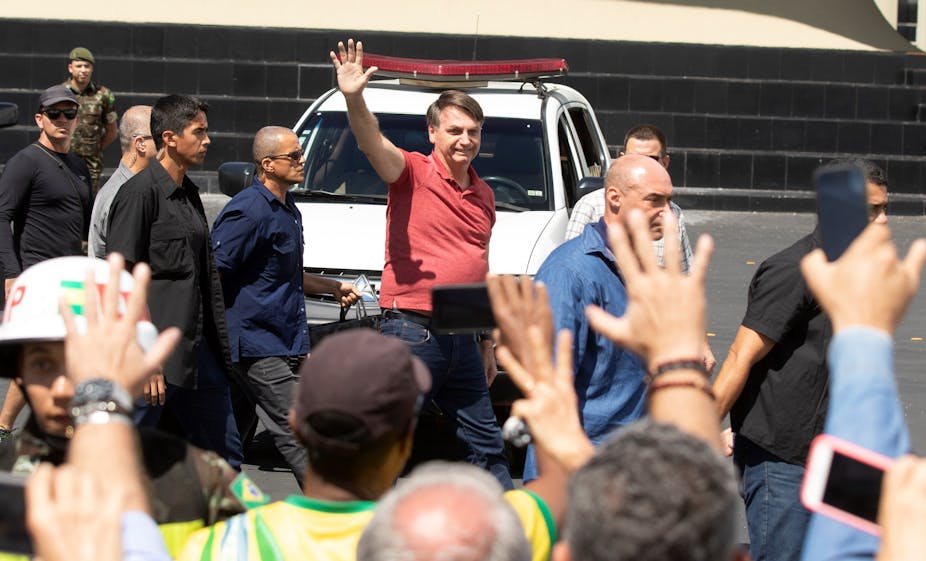Brazil faces a tremendous uphill struggle in its response to COVID-19, the disease associated with the new coronavirus. Already eroded by years of budget cuts, the country’s public health system, the Sistema Único de Saúde (SUS), has been further undermined by the president, Jair Bolsonaro.
The country’s public health response and political landscape have been thrown into disarray. Bolsonaro sacked his health minister, Luiz Henrique Mandetta, on April 16. He then participated in a demonstration during which opposition to lockdown measures was combined with calls for a military intervention to shut down Brazil’s congress and supreme court.
Bolsonaro’s reaction to COVID-19 is, at its heart, one of denial. On March 24, in an official national address, Bolsonaro dismissed the disease as no more than a “gripezinha” (small flu) for most people. He suggested that Brazilians have somehow acquired an immunity to disease by “diving into sewers”.
Bolsonaro ignored and openly challenged the advice of health authorities, repeatedly clashing with Mandetta, as well as with state governors and mayors who opted to impose lockdowns. Arguing that the economy cannot stop, Bolsonaro has pushed for a return to business-as-usual, meeting crowds of supporters, going to shops and refusing to limit his own movement.
Misinformation and politicking
But Bolsonaro has also spread misinformation about the virus. He touted a chloroquine-based therapy, despite the absence of corroborating scientific evidence. He called for “a day of fast and prayer” on April 5 to tackle the virus. On April 20, he knelt before an evangelical pastor who declared that Brazil was free of the virus.
Bolsonaro is also trying to use the pandemic for political gain. His followers have taken to the streets to demand the sacking of politicians who imposed lockdown. Calls for a military intervention among these supporters, and Bolsonaro’s open confrontation with Brazil’s legislative and judicial bodies, reveal an attempt to reinforce the executive power of the president by boosting the role of the military as political broker. This shows the radicalisation and increased militarisation of Bolsonaro’s brand of populism.
In early April, the ministry of health made an about-face on its coronavirus response. It moved from emphasising the need to maintain wide-ranging social distance measures, to explicitly signalling a transition to selective social distancing of vulnerable groups only – Bolsonaro’s preferred solution. This revealed a creeping politicisation of the health ministry, of which Mandetta’s sacking is the latest example.
The Brazilian response to COVID-19 has become a terrain of political strife, which now threatens the very survival of the country’s democracy.

Organised confusion
Bolsonaro may be simply trying to weather a crisis that has revealed, once again, his own failings. He may be hoping to escape responsibility for the inevitable economic consequences of the lockdown.
But some commentators have suggested that there is a method behind Bolsonaro’s efforts to produce confusion. The rise of “Bolsonarismo” is viewed by his supporters as a war against the establishment and political correctness. Bolsonaro feeds on, and fosters, a climate of confrontation and uncertainty that helps him secure the loyalty of his base. He benefits from unsettling other forms of authority in the country, be it political or otherwise.
Since coming to power in January 2019, Bolsonaro has led an attack on science and professional expertise – cutting research funds, substituting managers of research institutes with inexperienced political appointees, publicly intimidating scientists, and dismissing public universities as havens of leftist indoctrination.
COVID-19 is a new phase of this ongoing war, presenting Bolsonaro with an opportunity to attack political opponents and discredit “mainstream media” and any dissent. He has questioned the number of reported COVID-19 deaths, suggesting that they had been manipulated for political purposes. His education minister, Abraham Weintraub, joined the xenophobic bandwagon by blaming China for the virus. Bolsonaro’s followers have accused Rede Globo, one of the country’s most important media networks, of spreading alarmism and “fake news”. The parallels with the US Trump administration are striking.
Read more: Just like Trump, Brazil's Bolsonaro puts the economy ahead of his people during coronavirus
Populism versus public health
The situation in Brazil is a stark reminder of the real-life consequences of politicking around science and expertise, and of populist manipulation. Bolsonaro’s combination of foot-dragging and political manoeuvring is costing the country precious time and many lives. His strategy of chaos produces uncertainty around COVID-19 and hampers the effectiveness of Brazil’s response.
The number of cases and deaths is escalating with black people and other vulnerable groups taking the brunt of the epidemic. In conversations we’ve had ourselves, frontline health workers have complained of confusing directives, inadequate training and shortages of protective equipment.
In the face of the confusion, popular support for the lockdown remains high – although the number of Brazilians staying home is steadily decreasing. This is partly because of pressure from employers for a return to work, following the lead of the federal government which backed a “Brazil cannot stop campaign” that contradicted social isolation and asked citizens to get back to work. On March 28, this campaign was banned by the judiciary.
In this complex and volatile environment, Brazil’s health professionals, researchers and public servants are demonstrating their dedication and excellence. Despite the uncertainty and the attacks waged by the federal government, the state and municipal levels of the SUS have shown remarkable resilience and provide a glimmer of hope.

